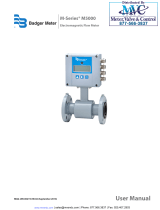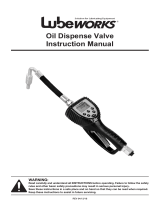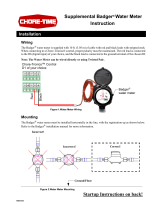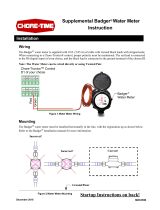Page is loading ...

Installation &
Operation Manual
BadgerMeter,Inc.
®
IMPORTANT !!!! This manual contains important warnings
and information. READ AND KEEP FOR REFERENCE.
Specific keypad/software set-up instructions are contained in the
keypad packaging.
Model RF-OMS
Radio Frequency Oil
Management System
IOM-085-01
Part No. 53400-085
11-02

2
TABLE OF CONTENTS
Definitions ...................................................................... 2
Installation ...................................................................... 2
Operating the Meter ....................................................... 3
Programming the Meter ................................................. 3
Operational Functions ................................................... 4
Service ........................................................................... 4
Dimensional Drawing .................................................... 7
Specifications ................................................................. 7
Parts Drawing ........................................................... 8-10
Troubleshooting ........................................................... 11
Factory Settings
Each meter is preprogrammed and calibrated at the factory.
Unless otherwise specified at the time of the order, each
meter is programmed in quarts for use with motor oil. The
meter is shipped in the Manual Mode. If you need to change
the factory settings, see page 6.
1000 psi (67 bar) Maximum Working Pressure
8 gpm (30 Lpm) Maximum Flow Rate
This Meter is designed specifically to dispense motor oils
(S.A.E. 5-50), gear oils (S.A.E. 80-240), automatic
transmission fluid, antifreeze (Ethylene Glycol) solution,
and hydraulic fluid. Other models of the EPM are designed
to dispense brake fluid or windshield wiper fluid.
SYMBOLS
This symbol is an alert to the possibility of serious injury
or death if the instructions are not followed.
This symbol is an alert to the possibility of damage to or
destruction of equipment if the instructions are not followed.
Equipment Misuse Hazard
1. This equipment is for professional use only.
2. Read all instructions, tags, and labels before
operating the equipment.
3. Use the equipment only for its intended purpose.
4. Do NOT modify or alter the equipment.
5. Do NOT leave equipment unattended while
dispensing.
6. Check equipment daily. Repair or replace worn or
damaged parts immediately.
7. Do NOT exceed the maximum working pressure level
of the lowest rated system component.
8. Use only extensions and nozzles that are designed
for use with this equipment.
9. Use only fluids and solvents that are compatible with
the equipment. Read all fluid and solvent
manufacturer’s warnings.
10.Tighten all fluid connections before operating this
equipment.
11.Do NOT stop or deflect leaks with hands, body,
gloves, or rags.
12.Do NOT dispense valves towards any person or any
part of the body.
13.Do NOT place hands or fingers over the end of or into
the dispense valve.
14.Comply with all local, state, and federal fire, electrical,
and safety regulations
15. Use of this product in a manner other than specified
in this manual may result in impaired operation or
damage to equipment.
Radio Frequency Oil Management
System Overview
Badger Meter’s Radio Frequency Oil Management
System (RF-OMS) consists of an A/C powered keypad
with an integrated ticket printer and up to 48 RF
equipped meters. The product has been designed to
offer greater control over the dispensing of AFP with
significant reductions in installation costs and the
associated hardware common to most hard-wired
systems today. Dispensing information and authority is
communicated from the keypad to the meter with actual
dispensing information being communicated back to the
keypad utilizing 902-928 Mhz frequency hopping spread
spectrum radio communications. Tracking of all
dispenses, by PIN#, Work Order #, fluid type, Meter/Hose
# allows the software to compute the remaining balances
of up to 8 different tanks/fluids.
Keypad Overview
FCC ID: GIF-RFKEYPAD
FCC CERTIFIED, PART 15, SUBPART C
This device complies with Part 15 of the FCC Rules.
Operation is subject to the following two conditions: (1) this
device may not cause harmful interference, and (2) this
device must accept any interference received, including
interference that may cause undesired operation.
The keypad consists of an integrated 40-column ticket
printer, antennae for RF communications and a 16-
button keypad to enter and authorize dispensing
transactions. The Keypad also houses the electronics
that maintain the computed inventory levels via
deliveries, dispenses and other manual transactions.
The Keypad is A/C powered and should be installed
indoors as close to the meters it will communicate with
as possible (Max 300 feet) but yet secured from abuse
and environment issues. Reference the keypad
installation instructions for a list of materials that may
significantly impact RF range. Software in the keypad
recognizes two levels of authority: Supervisor and
Operator. The Supervisors Personal Identification
Number (PIN) allows for system initialization,
configuration, communication diagnostics and report
generation. The operator pin authorizes and records all
dispenses.
If RF Communications from the keypad to the meter are
unavailable (temporary obstruction, damage to the
keypad, power outage, etc) the meter may be
programmed to dispense in the manual mode by
entering a code via the buttons on the meter. In this
mode, the meter will only dispense after verifying that it

3
be programmed to the meters that you want it to
communicate with. To begin the programming,
reference the detailed Instruction Manual on Page 5.
Menu Configuration.
Software included in the RF-OMS allows for tracking of
all fluids under its control. However all tanks need to be
defined and entered into the keypad detailing the size,
type of fluid, beginning balance, and any deliveries
made by the oil company supplier. Once established,
the software automatically tracks all dispenses and
calculates the balances. The system recognizes two
levels of authority: Supervisor initilizes, configures,
communicates and report generation and Operator
dispenses fluids to work-orders.
The procedure for supervisor operations is located in
the Instruction Manual on Page 5.
Testing the system.
You are now ready to test the system communications.
The procedure for testing the system is located in the
detailed Instruction Manual on Page 23.
Meter Installation
Pre-Installation Procedure
1. Relieve the system pressure:
a. Turn off the power supply to the pump or close the
shutoff valve.
b. Dispense any fluid in the system into a waste
container by opening the dispense valve.
c. Open all bleed-type master air valves and fluid
drain valves in the system.
d. Leave the drain valve open until ready to
pressurize the system.
2. Close the shutoff valve.
3. Ground hoses and reels:
Grounding reduces the risk of static sparking;
ground all system components according to local,
state, and federal code. Consult the user's manual
of the pump and other system components to
ground the following:
i. Pump: follow manufacturer's recommendations
ii. Air and Fluid Hoses: use only grounded hoses
iii. Air Compressor: follow manufacturers
recommendations
iv. Fluid Supply Container: Follow the local code
Do not use Teflon
®
tape on pipe joints; it may cause a
loss of grounding across the joint.
Installation Procedure
1. If this is an existing installation, go directly to step 6.
Steps 2 through 5 are for flushing the system prior to
installing the meter.
2. Close fluid dispense valves at every dispense position.
3. Once the main fluid outlet valve at the pump is
closed, the air pressure to the pump motor is properly
adjusted, and the air valve is open, slowly open the
main fluid valve.
4. Place the hose end in a waste container. Make sure
hose is secure so no fluid will leak during flushing.
is unable to communicate with the keypad. All
dispenses in this mode are recorded to memory and,
in total, are communicated to the keypad once
communications are reestablished. Inventory levels
and consumption data are updated when
communications are restored.
Meter Overview
FCC ID: GIF-RFEPM
FCC CERTIFIED, PART 15, SUBPART C
This device complies with Part 15 of the FCC Rules. Operation
is subject to the following two conditions: (1) this device may not
cause harmful interference, and (2) this device must accept
any interference received, including interference that may
cause undesired operation.
The meter is Badger’s Electronic Preset meter (EPM)
equipped with RF communications allowing
authorization and dispense information. Once a work
order has been set up, the operator simply pulls the
trigger and the authorized amount of fluid for that meter
will dispense. The valve will automatically shut off when
the full amount has been dispensed. A “Top Off” feature
allows additional amounts to be dispensed and tracked
after the valve closes. Upon completion of the dispense
effort, the valve locks prohibiting any unauthorized
dispense to occur.
Overhead view of Keypad
Keypad Installation.
The keypad should be mounted, near a 110 volt
electrical outlet, to a structurally sound wall through the
two holes on the side of the keypads casing. Height on
the wall should be 5 to 6'. Care should be taken to avoid
mounting behind any steel objects (tool storage
cabinets and metal chain linked fences) that may block
the RF communication signal. Care should also be
taken to avoid direct, significant heat sources.
Meter/Keypad Programming.
The keypad has been wall mounted, paper installed in
the printer, and power supply activated, the unit will go
through certain self-diagnosis. The unit is then ready to

4
dispense order is received by the meter.
QT
.
QT
..
RF Mode
1. Press
on meter to receive dispense order
from keypad: Trigger unlocks.
QT
.
..
RF Mode Batch
2. Pull the trigger to begin the flow. The valve will
automatically lock in place, even though the trigger
will fall back to the closed position. The flow will
automatically shut off when the programmed
dispense order size has been dispensed.
Do NOT press before topping off. The meter will
return to a lock-out position and not allow additional fluid
to be dispensed until receipt of a valid dispense order
from this keypad.
3. The user has the option to top off at the end of the
dispense order. To top off the tank, simply pull the
trigger to begin the flow and release when the
desired amount has been pumped.
4. Press the
button when finished to reset the
meter. This total quantity dispensed will be
transmitted to the keypad and the meter will return
to a lock-out position. The meter is now ready to
receive the next dispense order from the keypad.
Manual Mode - No RF Communications
1. Program the meter to manual mode by holding
down TOTAL key and pressing
, , ,
and AUTO. The solenoid will now unlock and the
meter may be used as a standard Auto Series EPM.
QT
.
QT
..
Manual Mode
5. Slowly open the dispense valve and allow enough oil
to pass through to ensure that the system is clean.
Close the valve and repeat for all dispense positions.
Note: If the system has multiple dispense positions, begin
at the position farthest from the pump, and move
towards the pump.
6. Relieve the Pressure (see Relieve the System
Pressure, above).
7. Insert the metal end of the hose into the swivel
located at the end of the handle, and tighten
completely with an open ended, adjustable wrench.
Attaching the hose
Note: The threaded end of the meter will always have
female threads, so the metal end of the hose must
have male threads. Apply thread sealant to the male
end. The inlet and outlet connections are both 1/2"
NPT or 1/2" BSPP depending on meter model.
8. Thread the new nozzle onto the opposite end of the
meter and screw in tightly with an open ended,
adjustable wrench.
Installing the nozzle
9. Open all dispense position shut-off valves, and start
the pump to pressurize the system.
10. To ensure accuracy, purge all air from the fluid lines
and dispense valve before use.
Operating the Meter - Manual Mode -
When RF Communications are
Unavailable
Operating the Meter
RF Mode:
When the battery pack is attached to the meter, the meter
will automatically enter the RF Mode. The trigger is in a
lock-out position and no oil can be dispensed until a

5
2. Pull the trigger to begin the flow.
3. When the desired amount has been pumped,
release the trigger to stop the flow. Press
to
reset counter display to zero.
Programming the Preset Batch Function when RF
Communications are Unavailable
1. To enter the batch-programming mode, press the
button. The following screen will appear:
QT
.
.
AUTO
-->
:
QT
.
..
AUTO
-->
:
-->-->
:
Auto Mode
2. The meter is now ready to be programmed. Change the
batch size by pressing the
, and
buttons.
a. Pressing the 10 button will increase the
batching amount in increments of 10 units.
b. Pressing the 1 button will increase the batching
amount in increments of 1 unit.
c. Pressing the 0.1 button will increase the
batching amount in increments of 0.1 units.
QT
.
..
AUTO
-->
3. Pull the trigger to begin the flow. The valve will
automatically lock in place, even though the trigger will
fall back to the closed position. The flow will
automatically shut off when the desired batch size has
been dispensed.
The valve will always lock in the maximum open position.
Note: At any time during the operation of the meter, the
flow may be stopped by pressing the red button.
This will electronically close the valve, stopping the flow.
Batching may be resumed by pulling the trigger.
4. The user has the option to top off at the end of the batch.
To top off the tank, simply pull the trigger to begin the flow
and release when the desired amount has been
pumped.
5. Press the
button when finished to reset the
meter. It is now ready for the next batch.
Do NOT press before topping off. The meter will
begin a new batch.
Normal Operating Mode Functions
Total
This option allows users to see the accumulated total as
well as the resettable total.
Press and hold the button while in normal
operating mode to see the accumulated total. Continue
holding and after three seconds the screen will change to
the resettable total, which displays the total fluid
dispensed since the resettable total was last set back to
zero.
Press the
button while viewing the resettable total
to set the resettable total back to zero. Release the
button to return to the normal operating screen.
Note: The accumulated total cannot be reset, unless the
user changes from English units to metric units or from
metric to English units. (See Changing Factory Settings.)
L
RESET TOTAL
Total Function
Electrical Override
In case of an emergency or to interrupt a batch, the meter
is equipped with an electrical override. This option
automatically closes the valve in the meter, stopping the
flow immediately. Batching can be continued after an
override, even if the meter is in the middle of a
programmed batch.
Press the red
button to activate the electrical
override. This can only be used when the valve is open.
Service
Changing the Battery
When the batteries need to be changed, a progression of
warnings will appear on the screen.
1. First warning: the Low Battery Icon will appear in the
lower left corner of the display. This means that the
batteries are low and need to be changed within one
week after the icon first appeared.
QT
.
-
+
QT
.
QT
..
-
+
-
+ +

6
Programming the Units
This meter comes with the option to choose 4 different
units of measure. Unless otherwise specified at the time
of the order, each meter is programmed in liters for use
with motor oil. The ‘L' will be flashing on initial start-up.
1. Toggle the four options (‘L’, ‘QT’, ‘GAL’, ‘PT’) by
pressing the
button.
2. When the desired option is on the screen, press the
button to advance. The units of measurement
icon will stop flashing and the first digit of the scale
factor will begin flashing.
Note: If the ‘L’ units have been selected, the decimal point
will begin to flash. The user now has the option to change
the decimal point to either a period or a comma. To do
this, press the
button. Press the button to
advance to the scale factor screen.
Changing the units of measurement from metric to English,
or from English to metric will clear the accumulated total,
and resettable total.
2. Second warning: The AUTO function will shut off and
the auto icon will disappear. This means the battery
power is too low to run the auto function. The meter
can still run in manual mode.
3. Third Warning: The screen goes blank. This means
there is no power left. The display cannot be run.
However the meter will still allow fluid to pass through
when the valve is opened, but it will not measure flow.
• The battery compartment is located on the underside of
the trigger guard. Unscrew the two screws located under
the guard and remove the battery cover to expose the
batteries.
• Replace the old batteries. This meter takes 4 AA
alkaline batteries. Replace the cover and the screws
when finished. Note battery polarity markings inside
battery compartment cover.
• Dispose of used batteries properly according to local
regulations.
Changing Factory Settings
Factory Settings
Each meter is preprogrammed and calibrated at the
factory. Unless otherwise specified at the time of the
order, each meter is programmed in liters for use with
motor oil.
1. Press
to wake up the meter if screen is blank.
To enter the programming mode, press and hold the
<PROGRAMMING> key located in the access hole
under the meter for 2 seconds. (See picture below)
Location of access hole for PROGRAMMING Key.
After the screen flashes, it will display the scale factor and
units of measurement.
QT
.
QT
.
Initial Programming Screen
Use a 5/32"
Allen wrench
or similar
blunt tool

7
,
L
Scale Factor Screen
3. Press
to advance to the next number in the scale
factor.
4. Repeat steps 2 and 3 for all five digits in the scale factor.
Note: All digits can be scrolled between 0 and 9 except
the first, which can only be scrolled from 0 to 1.
5. When finished setting the scale factor, press the
button and the scale factor and units measurement
screen will be replaced with the pulse delay screen:
Setting the Pulse Delay Factor
The Pulse Delay Factor is used to correct for fast flow
rates by closing the valve in the meter between one and
five pulses sooner than the selected value. The meter is
factory programmed with a pulse delay factor of 0.
Pulse Delay Screen
Advance through all five scale factor digits by pressing the
button. The above screen will now be displayed.
1. The 'PS-' will be followed by a flashing zero. The zero is
the initial setting of the pulse delay factor
2. Scroll between settings (0 to 5) by pressing the
button.
3. When finished selecting the pulse delay factor, press
and the display will return to the scale factor screen.
4. When finished programming these options, press the
<PROGRAMMING> key and hold it until the screen
flashes three times then goes blank. Press the
button to return to the normal operating screen.
Recalibrating the Meter
The Scale factor is used to adjust the accuracy of the
meter. The scale factor will be set at the factory for oil. The
primary use for the recalibration function is if the user
wants to batch fluids with a viscosity other than 10W oil.
If the fluid has a lower viscosity, more fluid can slip past
the gears without being detected. Changing the scale
factor can adjust the meter to compensate for that loss
The meter multiplies each pulse by this number to correct
the accuracy when it converts to the specified units, so the
reading on the dial is always correct.
For an approximate scale factor for fluids of different
viscosities, consult the following chart:
(Unless otherwise specified at the time of the order, each
meter is programmed in quarts for use with motor oil.)
Note: The original meter scale factor is written inside of
the meter when calibrated at the factory. It may have been
revised after field installation. Use scale factor shown on
display, not the trigger.
To view the current program scale factor, do the following:
1. Press and hold the
button.
2. Then, press and hold the
button.
For an absolute scale factor, perform the following test:
Run a pre-measured batch of fluid through the meter. If the
meter is programmed to batch 4.200 quarts, and it batches
the entire amount but only reads 4.000 quarts, then the scale
factor needs to be adjusted. Divide the quantity delivers (4.2)
by the quantity dispensed (4.0) to get the error factor (1.05)
To calculate the new scale factor:
If existing scale factor is 1.0123, the calculation would be:
1.0123 (existing scale factor) x 1.05 (error factor) = 1.0629
(new scale factor)
Change the scale factor:
Press <PROGRAMMING> key to enter the programming
mode, and the
button to advance through the units
mode.
1. The first digit of the scale factor will be flashing.
2. Press the
button to scale through the numbers.
Type of Fluid Viscosity (cSt) Scale Factor
Water/Anti-Freeze 5 1.044
Anti-Freeze 18 1.007
Automatic Transmission Fluid
80 1.002
Motor Oil 140 1.000
Mobil 80W-90 450 0.999
50W 900 0.996
140W 1800 0.993

8
11.00"
3.50"
6.00"
SPECIFICATIONS
English Metric
Maximum Flow * 8 gpm 30 lpm
Minimum Flow * 0.25 gpm 1 lpm
Operating Pressure (Maximum) 1000 psi 67 bar
Operating Pressure (Minimum) 5 psi .35 bar
Operating Temperature (Maximum) 120° F 50° C
Operating Temperature (Minimum) 20° F - 5° C
Accuracy +/- 0.5% +/- 0.5%
5-Digit LCD Display, 10 mm High x 5 mm Wide Quarts, Pints, Gallons Liters
Inlet and Outlet Connections ½” NPT ½” BSPP
* Tested with DTE-25 motor oil at ambient temperature. Min.-Max. flow range will vary with fluid viscosity.

9
ITEM # PART DESCRIPTION PART NUMBER
1 Top Case with Screws 64103-006
2 Keypad 63802-002
1
2
NOTE: For service required on parts not listed above, please contact Badger Meter's
authorized service center in Milwaukee.

10
1
2
ITEM # PART DESCRIPTION PART NUMBER
1 Battery Door with Screws 64103-004
2 Bottom Case with Screws 64103-003
NOTE: For service required on parts not listed above, please contact Badger Meter's
authorized service center in Milwaukee.

11
ITEM # PART DESCRIPTION PART NUMBER
1 Valve Assembly 64103-001
2 Gear Service Kit with O-Ring 62896-001
3 Trigger Assembly 64103-005
1
2
3
NOTE: For service required on parts not listed above, please contact Badger Meter's
authorized service center in Milwaukee.

®
Due to continuous research, product improvements and enhancements,
Badger Meter reserves the right to change product or system specifications
without notice, except to the extent an outstanding bid obligation exists.
BadgerMeter,Inc.
P.O. Box 245036, Milwaukee, WI 53224-9536
Telephone: (414) 355-0400 / (877) 243-1010
Fax: (414) 355-7499 / (866) 613-9305
www.badgermeter.com
Copyright © Badger Meter, Inc. 2002. All rights reserved.
Please see our website at
www.badgermeter.com
for specific contacts.
/















